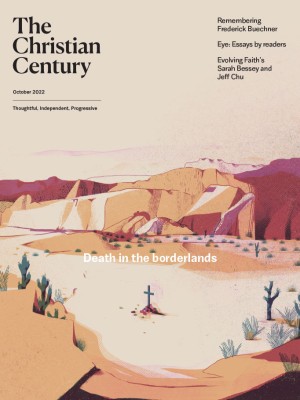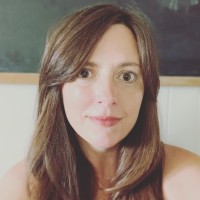October 23, Ordinary 30C (Joel 2:23–32)
In Joel I encounter the God who has counted what I’ve lost and promised to pay it back.
I often read the first stanza of the poem “Bible Study” by Tony Hoagland as a prayer: “Who would have imagined that I would have to go / a million miles away from the place where I was born / to find people who would love me? / And that I would go that distance and that I would find those people?”
The poem’s tone of wonder helps me to see the trajectory of my own life as a series of minor miracles. Finding people who love you when you have for so long felt unloved and unlovable can feel as much like a miracle as a dramatic healing or resurrection does.
Read our latest issue or browse back issues.
But this isn’t just a poem about the redemption of human relationships. There is a postapocalyptic mood to “Bible Study.” A midwestern sun is “inflamed as an appendicitis.” The gears of a machine threaten to swallow up a hand to the wrist. The speaker has traveled alone for so long that he starts reading the Gideon Bibles in his motel rooms for company.
There he finds the unlikely story of a God who has an interest in him. “I thought some wrongness in my self had made me that alone,” he tells us, and when he reads, “You are worth more to me / than one hundred sparrows,” he weeps.
Years of childhood spiritual abuse have made me a wary reader of scripture and more of an observer of religion than a participant. I often have to come at God slant—or let God sneak up on me in a poem. Hoagland’s poems are often funny, but reading “Bible Study” I’m struck by the speaker’s earnest encounter with the God of scripture, who affirms that his survival was not merely accidental and that his life has value.
Poems like “Bible Study” are a refuge where I can eye scripture from a safe distance until I feel ready to engage it directly again. Hoagland said in an interview that he was raised without religion and that poetry was the only constant in his life. I almost envy that.
In the prophetic poetry of Joel, the setting is more fantastic than a cheap motel room and the cataclysms are more horrific than loneliness. Joel tells us the sun will darken and the world will end. I didn’t expect to find encouragement here. But when God says, “I will repay you for the years that the swarming locust has eaten,” I soften just as I do reading Hoagland. Thousands of years separate me from Joel, and I haven’t experienced exactly this kind of destruction, but I understand what it feels like to lose time to tragedy.
There are many kinds of apocalypse, and in our lifetimes we may live through the ends of many worlds. I have now survived a few. In Joel I encounter the God who has counted what I’ve lost and promised to pay it back. The prophet may be speaking to history and events I don’t quite understand and a life experience I can’t fathom and wouldn’t want to, but the poet captures my desire for confirmation that we have purpose, and that our lives have divine worth.
When I try to read Joel as a history or a narrative of cause and effect, the charm dissolves. The God who promises restoration is the same God who sent the locusts as punishment. Why should I feel so tenderly toward the one who caused my distress in the first place? Is this story a reminder of divine care or another lesson about how undeserving I am of grace? Some scholars have suggested this whiplash of punishment and redemption is evidence that Joel has two different authors, one of whom is decidedly more optimistic about humanity’s future.
But when I approach Joel as poetry, this seesaw of destruction and hope reflects a truth of my experience that doesn’t make logical or even narrative sense. Survival doesn’t compute when we’ve watched so many others perish. When I look at the ledger of my own life, I can see the way things have consistently fallen apart and also somehow fallen together. I can see how easily the scales could have tipped in the other direction; a feather’s weight was the difference. I don’t know why or how I made it this far. I didn’t deserve more than anyone else. But I can’t shake the feeling that someone has dealt wondrously with me.
“There shall be those who escape” says Joel, and among them “shall be those whom the lord calls.” To what purpose, I wonder. Maybe to see and give courage to all of us who will endure our own endings. As God says in Hoagland’s poem, “Survive. And carry my perfume among the perishing.”
* * * * * *
Jon Mathieu, the Century's community engagement editor, engages Jessica Mesman in discussion about her reflection on Joel and on Tony Hoagland's poem "Bible Study."






